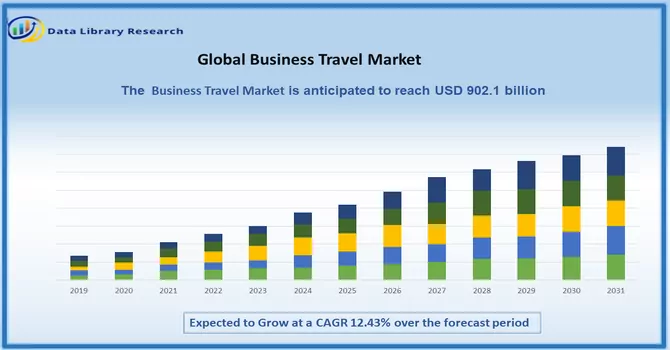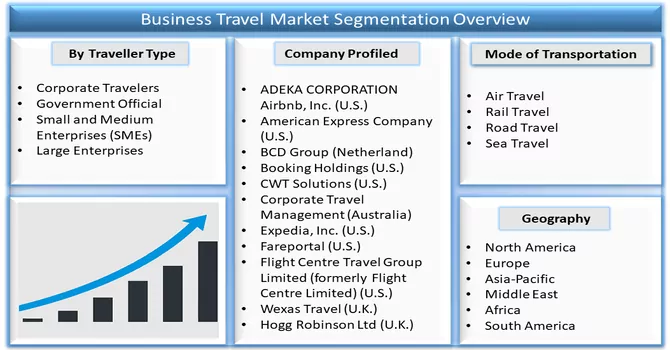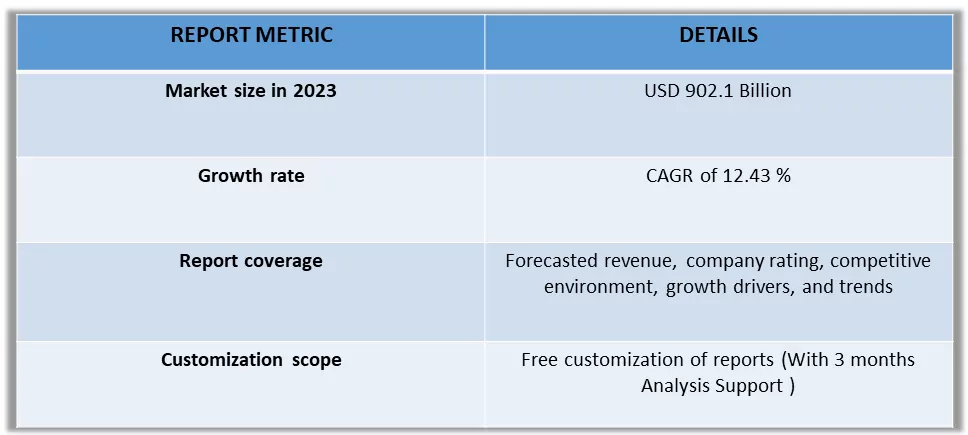The Global Business Travel Market is currently valued at USD 902.1 billion in 2023 and is poised to register a CAGR of 12.43% over the forecast period, 2024-2031.

Get Complete Analysis Of The Report- Download Free Sample PDF
The global business travel market has long been a dynamic and integral component of the travel and hospitality industry. This segment caters specifically to professionals and corporate travellers, encompassing a wide range of services such as flights, accommodation, transportation, and related amenities tailored to the needs of business trips. Characterized by the pursuit of efficiency, convenience, and connectivity, the business travel market thrives on the demands of a corporate landscape that values face-to-face interactions, networking opportunities, and the exploration of new business prospects.
The market has evolved in response to technological advancements, with digital tools and platforms streamlining booking processes and providing real-time information to enhance the overall travel experience. However, the business travel sector has faced challenges, particularly amid the COVID-19 pandemic, with travel restrictions, remote work trends, and health concerns reshaping the landscape. As the global economy rebounds, the business travel market is poised for transformation, integrating innovative solutions to meet the evolving needs of corporate travelers in a post-pandemic era. The growth of the global business travel market is propelled by several driving factors, with economic expansion and globalization playing a pivotal role. As businesses expand their operations across borders, the need for face-to-face interactions, meetings, and collaborations becomes increasingly critical. The continuous growth of international trade and investments fosters a demand for efficient and reliable business travel services. Moreover, advancements in technology contribute to the sector's growth, with digital platforms streamlining booking processes, providing real-time information, and enhancing the overall travel experience. The advent of sophisticated tools, mobile applications, and virtual conferencing solutions further augments the efficiency and convenience of business travel. Additionally, a rising trend in workforce mobility and a growing emphasis on cultivating business relationships contribute to the sustained demand for business travel services. Overall, the confluence of economic development, technological innovation, and evolving corporate needs acts as a driving force behind the expansion of the global business travel market.
Market Segmentation: The Global Business Travel Market Is Segmented by Traveler Type (Corporate Travelers, Government Official, Small and Medium Enterprises (SMEs), and Large Enterprises), Mode of Transportation (Air Travel, Rail Travel, Road Travel and Sea Travel) and Geography (North America, Europe, Asia-Pacific, Latin America, Middle East & Africa). The market size and forecasts are provided in terms of value (in USD million) for all the above segments.

For Detailed Market Segmentation - Download Free Sample PDF
The global business travel market is witnessing notable trends that reflect the evolving landscape of corporate travel. One prominent trend is the increasing integration of technology to enhance the overall travel experience. From advanced booking platforms and mobile applications to seamless expense management systems, businesses are embracing digital solutions to streamline and automate various aspects of travel planning. Another significant trend is the growing emphasis on sustainability within business travel practices. With a heightened awareness of environmental concerns, companies are exploring eco-friendly travel options, promoting carbon footprint reduction, and implementing green initiatives. Additionally, the rise of remote and flexible work arrangements has given way to a hybrid model, influencing travel trends as businesses seek a balance between in-person engagements and virtual collaboration. As the business travel landscape continues to evolve, these trends reflect the industry's response to technological advancements, environmental considerations, and shifts in working norms.
Market Drivers:
Economic Expansion and Globalization
The ongoing expansion of economies and globalization has led to increased business activities across borders. As companies extend their operations internationally, there is a rising demand for business travel to facilitate meetings, negotiations, and collaborations. Emerging markets, in particular, are becoming major hubs for business, driving the need for executives and professionals to travel for networking, market exploration, and partnership development.
Technological Advancements in Travel Services
The continuous advancement of technology plays a pivotal role in driving the business travel market. Online booking platforms, mobile applications, and travel management software have become integral tools for businesses, making it easier to plan, book, and manage travel arrangements. The integration of artificial intelligence and data analytics further enhances travel efficiency, providing personalized recommendations, cost-saving strategies, and real-time updates, contributing to the overall growth and convenience of business travel.
Market Restraints:
The global business travel market faces several challenges that act as restraining factors, influencing its dynamics and growth trajectory. One significant restraint is the increasing adoption of virtual communication tools and remote collaboration platforms. The rise of advanced technologies for virtual meetings, video conferences, and telecommuting has reduced the necessity for frequent business travel. With improved connectivity and seamless communication channels, companies are increasingly opting for cost-effective and sustainable alternatives to traditional face-to-face interactions, impacting the demand for business travel services.Moreover, geopolitical uncertainties and security concerns pose another set of challenges for the business travel sector. Political instability, terrorism threats, and health crises, such as the COVID-19 pandemic, have disrupted global travel patterns and created a sense of insecurity among business travellers. Companies are compelled to reassess their travel policies and risk management strategies, sometimes leading to a reduction in international business trips. Additionally, the environmental impact of frequent air travel has become a growing concern. With the increasing emphasis on corporate social responsibility and sustainable practices, companies are under pressure to minimize their carbon footprint. This has led to a shift in mindset, with organizations exploring ways to reduce travel-related emissions by encouraging remote work and exploring eco-friendly alternatives.
The global business travel market has undergone a profound transformation due to the unprecedented impact of the COVID-19 pandemic. The virus, along with associated travel restrictions and health concerns, has led to a substantial decline in business travel activities. Governments worldwide implemented stringent measures such as lockdowns, quarantine requirements, and border closures to curb the spread of the virus, disrupting the usual flow of corporate travel.The pandemic accelerated the adoption of remote work and virtual communication tools, prompting companies to reassess the necessity of traditional business trips. Travel restrictions and health protocols have compelled organizations to prioritize employee safety, often opting for virtual meetings, webinars, and online conferences as viable alternatives. This shift in behavior has prompted a reevaluation of corporate travel policies and a likely long-term impact on the demand for business travel services.The uncertainty surrounding the duration and recurrence of the pandemic has further contributed to a cautious approach among businesses, leading to deferred or canceled travel plans. The economic repercussions of the pandemic have prompted companies to focus on cost-saving measures, affecting discretionary spending, including travel budgets.As the business travel sector grapples with these challenges, it has also presented an opportunity for the industry to innovate and adapt. Enhanced health and safety measures, flexible booking policies, and the integration of technology for contactless travel experiences have become focal points for the revival of business travel post-pandemic.In summary, the COVID-19 pandemic has had a profound and enduring impact on the global business travel market, reshaping traditional practices and driving a shift towards more flexible, technology-driven, and health-conscious approaches to corporate travel. The industry's recovery will depend on its ability to address these changes and provide solutions that align with the evolving needs and expectations of businesses in the post-pandemic era.
Segmental Analysis:
Corporate Travelers Segment is Expected to Witness Significant Growth Over the Forecast Period
Corporate travellers, those individuals who travel for business purposes on behalf of their company, enjoy several advantages that make their journeys more efficient and comfortable. One of the primary benefits is access to specialized services tailored to their needs, such as dedicated booking platforms, priority check-in, and exclusive lounges at airports. These perks help streamline the travel process, saving time and reducing stress. Corporate travellers also benefit from greater flexibility in travel arrangements, often being able to change or cancel bookings with minimal fees. This flexibility is essential for business trips, which may need to be adjusted at short notice due to changing schedules or unforeseen circumstances. Furthermore, many companies offer rewards programs or loyalty schemes for their corporate travellers, allowing them to accumulate points or miles that can be redeemed for future travel or other benefits. These programs can help reduce travel costs for both the traveller and the company. Thus, the advantages of corporate travel for travellers include convenience, flexibility, and cost savings, making business trips more efficient and enjoyable.
Rail Travel Segment is Expected to Witness Significant Growth Over the Forecast Period
Rail travel remains a popular mode of transportation worldwide, offering several advantages that contribute to its high use. One of the key factors driving rail travel is its efficiency, especially for short to medium distances. Trains often provide a faster and more direct route compared to road travel, particularly in congested urban areas. Rail travel is also valued for its convenience and accessibility. Many major cities have well-developed rail networks that connect key destinations, making it easy for travelers to reach their desired locations. Additionally, trains offer comfortable seating, onboard amenities, and the ability to move around during the journey, enhancing the overall travel experience. Moreover, rail travel is often considered more environmentally friendly than other modes of transportation, such as cars or planes, due to lower carbon emissions per passenger mile. This aspect of sustainability is increasingly important to travellers seeking eco-friendly options. Furthermore, rail travel is often perceived as safer and more reliable than other modes of transportation, particularly in regions where road conditions or air travel infrastructure may be less developed. This reliability is crucial for business travellers and tourists alike, who value punctuality and consistency in their travel plans. Thus, the high use of rail travel can be attributed to its efficiency, convenience, sustainability, and safety, making it a preferred choice for many travellers around the world.
North America Region is Expected to Witness Significant Growth Over the Forecast Period
Business travel in North America is prevalent due to several factors. Firstly, the region's large and diverse economy fosters extensive business activity, necessitating frequent travel for meetings, conferences, and negotiations. North America is home to many multinational corporations and major industries, such as technology, finance, and manufacturing, which require employees to travel regularly to conduct business. The region's well-developed transportation infrastructure, including airports, highways, and rail networks, makes travel convenient and efficient. Major cities like New York, Los Angeles, Chicago, and Toronto serve as key business hubs, attracting a significant volume of business travellers. Additionally, North America's cultural and linguistic diversity contributes to the need for business travel, as companies seek to expand their markets and establish international partnerships. The region's political stability and business-friendly environment also make it an attractive destination for business travellers. Moreover, advancements in technology, such as video conferencing and online collaboration tools, have complemented rather than replaced business travel. Face-to-face interactions remain essential for building relationships, closing deals, and fostering trust, driving continued demand for business travel in North America.

Get Complete Analysis Of The Report- Download Free Sample PDF
The analyzed market exhibits a high degree of fragmentation, primarily attributable to the presence of numerous players operating on both a global and regional scale. The competitive landscape is characterized by a diverse array of companies, each contributing to the overall market dynamics. This fragmentation arises from the existence of specialized solution providers, established industry players, and emerging entrants, all vying for market share. The diversity in market participants is underscored by the adoption of various strategies aimed at expanding the company presence. On a global scale, companies within the studied market are strategically positioning themselves through aggressive expansion initiatives. This often involves entering new geographical regions, targeting untapped markets, and establishing a robust global footprint. The pursuit of global expansion is driven by the recognition of diverse market opportunities and the desire to capitalize on emerging trends and demands across different regions. Simultaneously, at the regional level, companies are tailoring their approaches to align with local market dynamics. Regional players are leveraging their understanding of specific market nuances, regulatory environments, and consumer preferences to gain a competitive edge. This regional focus allows companies to cater to the unique needs of local clientele, fostering stronger market penetration. To navigate the complexities of the fragmented market, companies are implementing a range of strategies. These strategies include investments in research and development to stay at the forefront of technological advancements, mergers and acquisitions to consolidate market share, strategic partnerships for synergies, and innovation to differentiate products and services. The adoption of such multifaceted strategies reflects the competitive nature of the market, with participants continually seeking avenues for growth and sustainability. In essence, the high fragmentation in the studied market not only signifies the diversity of players but also underscores the dynamism and competitiveness that drive ongoing strategic manoeuvres. As companies explore various avenues for expansion, the market continues to evolve, presenting both challenges and opportunities for industry stakeholders.
Some of the major players operating in the global business travel market are:
Recent Development:
1) In April 2021, Flight Centre Travel Group, a renowned Australian travel agency, announced the continuation of its partnership with Gimmonix, an Israeli travel technology developer. This partnership focuses on further enhancing Flight Centre's digital connectivity infrastructure by leveraging Gimmonix's advanced hotel management and distribution solutions. By integrating Gimmonix's technology, Flight Centre aims to streamline its hotel inventory management, distribution, and pricing strategies, ultimately improving the booking experience for its customers. Gimmonix's solutions provide real-time data and analytics, enabling Flight Centre to make informed decisions and offer competitive pricing. Additionally, the partnership enables Flight Centre to expand its hotel inventory and provide a wider range of accommodation options to its customers. Overall, the collaboration between Flight Centre and Gimmonix underscores a commitment to innovation and digital transformation in the travel industry.
2) In August 2023, Google joined the sustainable aviation fuel (SAF) program initiated by American Express Global Business Travel (Amex GBT) and Shell Aviation. This collaboration aims to underscore the private sector's commitment to sustainable aviation and its role in financing the aviation industry's decarbonization efforts. The program, launched in the previous year, operates on a book-and-claim basis, with one million gallons of SAF initially allocated for corporate customers. This volume is sufficient to fuel nearly 15,000 transatlantic flights. By participating in this program, companies like Google demonstrate a clear demand for SAF, encouraging the development and adoption of sustainable aviation solutions. Google's involvement in the SAF program not only highlights its commitment to sustainability but also sets an example for other businesses. This initiative not only benefits the environment by reducing carbon emissions but also contributes to the evolution of business travel programs, emphasizing the importance of sustainability in corporate travel strategies.
Q1. What was the Business Travel Market size in 2023?
As per Data Library Research the Global Business Travel Market is currently valued at USD 902.1 billion in 2023.
Q2. At what CAGR is the Business Travel Market projected to grow within the forecast period?
Business Travel Market is poised to register a CAGR of 12.43% over the forecast period.
Q3. What are the factors driving the Business Travel Market ?
Key factors that are driving the growth include the Economic Expansion and Globalization and Technological Advancements in Travel Services.
Q4. Which region has the largest share of the Business Travel Market ? What are the largest region's market size and growth rate?
North America has the largest share of the market. For detailed insights on the largest region's market size and growth rate request a sample here.
Data Library Research are conducted by industry experts who offer insight on industry structure, market segmentations technology assessment and competitive landscape (CL), and penetration, as well as on emerging trends. Their analysis is based on primary interviews (~ 80%) and secondary research (~ 20%) as well as years of professional expertise in their respective industries. Adding to this, by analysing historical trends and current market positions, our analysts predict where the market will be headed for the next five years. Furthermore, the varying trends of segment & categories geographically presented are also studied and the estimated based on the primary & secondary research.
In this particular report from the supply side Data Library Research has conducted primary surveys (interviews) with the key level executives (VP, CEO’s, Marketing Director, Business Development Manager and SOFT) of the companies that active & prominent as well as the midsized organization
FIGURE 1: DLR RESEARH PROCESS

Extensive primary research was conducted to gain a deeper insight of the market and industry performance. The analysis is based on both primary and secondary research as well as years of professional expertise in the respective industries.
In addition to analysing current and historical trends, our analysts predict where the market is headed over the next five years.
It varies by segment for these categories geographically presented in the list of market tables. Speaking about this particular report we have conducted primary surveys (interviews) with the key level executives (VP, CEO’s, Marketing Director, Business Development Manager and many more) of the major players active in the market.
Secondary ResearchSecondary research was mainly used to collect and identify information useful for the extensive, technical, market-oriented, and Friend’s study of the Global Extra Neutral Alcohol. It was also used to obtain key information about major players, market classification and segmentation according to the industry trends, geographical markets, and developments related to the market and technology perspectives. For this study, analysts have gathered information from various credible sources, such as annual reports, sec filings, journals, white papers, SOFT presentations, and company web sites.
Market Size EstimationBoth, top-down and bottom-up approaches were used to estimate and validate the size of the Global market and to estimate the size of various other dependent submarkets in the overall Extra Neutral Alcohol. The key players in the market were identified through secondary research and their market contributions in the respective geographies were determined through primary and secondary research.
Forecast Model
